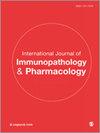免疫谱的改变影响肝细胞癌的疾病进展
IF 2.6
3区 医学
Q3 IMMUNOLOGY
International Journal of Immunopathology and Pharmacology
Pub Date : 2022-01-01
DOI:10.1177/03946320221078476
引用次数: 3
摘要
目的:肝细胞癌(HCC)作为一种慢性肝病,在很大程度上与免疫反应有关。先前的研究表明,不同的淋巴细胞亚群在控制或改善HCC等实体瘤的发展和预后方面发挥着重要作用。因此,本研究旨在调查HCC患者的免疫系统变化是否与疾病发展有关。方法:采用Ficoll密度离心法从30例HCC患者和30例健康志愿者中分离出外周血单个核细胞。用不同的第一抗体对分离的细胞进行染色,并通过流式细胞术测定不同免疫细胞的百分比。结果:与健康人相比,HCC患者外周血CD4+细胞、Tbet+IFNγ+细胞和GATA+IL-4+细胞数量显著减少(p<0.05)。患者组和健康组之间IL-17+RORγt+细胞没有显著变化。相反,Foxp3+CD127低细胞频率在患者中显著高于健康受试者(p<0.0001)。尽管Th2细胞数量的减少没有统计学意义,但HCC患者的Th1、Th2和Th17细胞数量显著低于健康对照组(p<0.001)。相反,与健康受试者相比,患者的Treg百分比显著增加(p<0.0001)。其他数据显示,健康个体的Th1、Th2和Th17细胞频率显著高于不同TNM HCC分期的患者,II期HCC患者的Th2除外(p<0.01–0.05)。不同TNM分期的患者Treg百分比显著增加(p<0.0001)。在所有CD4+T细胞中,Th2细胞的频率与HCC的TNM分期显著相关(p<0.05)。结论:我们的数据提供了进一步的证据,表明免疫变化可能参与决定HCC的进展和疾病结果。然而,值得一提的是,还需要更多的研究来澄清我们的结果,并解释其他免疫细胞对HCC发病机制的可能影响。本文章由计算机程序翻译,如有差异,请以英文原文为准。
Changes in immune profile affect disease progression in hepatocellular carcinoma
Objective: Hepatocellular carcinoma (HCC) as a chronic liver condition is largely associated with immune responses. Previous studies have revealed that different subsets of lymphocytes play fundamental roles in controlling or improving the development and outcome of solid tumors like HCC. Hence, this study aimed to investigate whether immune system changes were related to disease development in HCC patients. Methods: Peripheral blood mononuclear cells were isolated from 30 HCC patients and 30 healthy volunteers using Ficoll density centrifugation. The isolated cells were stained with different primary antibodies and percentages of different immune cells were determined by flow cytometry. Results: HCC patients indicated significant reductions in the numbers of CD4+ cells, Tbet+IFNγ+cells, and GATA+IL-4+cells in peripheral blood in comparison with healthy individuals (p < 0.05). There was no significant change in IL-17+RORγt+cells between patient and healthy groups. In contrast, Foxp3+CD127lowcell frequency was significantly higher in patients than healthy subjects (p < 0.0001). The numbers of Th1, Th2, and Th17 cells were significantly lower in HCC patients than healthy control (p < 0.0001), although the reduction in Th2 cell numbers was not statistically significant. On the contrary, Treg percentage showed a significant increase in patients compared to healthy subjects (p < 0.0001). Other data revealed that Th1, Th2, and Th17 cell frequencies were significantly higher in healthy individuals than patients with different TNM stages of HCC, with the exception of Th2 in patients with stage II HCC (p < 0.01–0.05). Treg percentage was significantly increased in patients with different TNM stages (p < 0.0001). Among all CD4+ T cells, the frequency of Th2 cell was significantly associated with TNM stages of HCC (p < 0.05). Conclusion: Our data provide further evidence to show that immune changes may participate in determining HCC progression and disease outcome. However, it should be mentioned that more investigations are needed to clarify our results and explain possible impacts of other immune cells on the pathogenesis of HCC.
求助全文
通过发布文献求助,成功后即可免费获取论文全文。
去求助
来源期刊
CiteScore
4.00
自引率
0.00%
发文量
88
审稿时长
15 weeks
期刊介绍:
International Journal of Immunopathology and Pharmacology is an Open Access peer-reviewed journal publishing original papers describing research in the fields of immunology, pathology and pharmacology. The intention is that the journal should reflect both the experimental and clinical aspects of immunology as well as advances in the understanding of the pathology and pharmacology of the immune system.

 求助内容:
求助内容: 应助结果提醒方式:
应助结果提醒方式:


